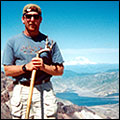
Building Confidence by Risking Failure:
Expeditionary Learning
by Peter Menth
One way to build self-esteem is to help build student self-confidence; and one way to build self-confidence is to achieve a goal in spite of what seem to be insurmountable odds. Expeditionary Learning is a unique program that emphasizes hands-on, project-based, group learning, where students participate in expeditions and the real world becomes the classroom. In this real-world setting, we routinely give students the opportunity to overcome obstacles.
Four days of backpacking in Yosemite's snow-covered high country is considered the ultimate challenge by my students. This adventure helps – forces – students to take responsibility for their own well-being because they are responsible for planning for all possibilities while on the trail. Students learn how to prioritize equipment by balancing need with weight and efficiency and, perhaps most importantly, how to maintain good physical condition, such as preventing dehydration, conducting proper hygiene, and eating enough quality food.
The insurmountable odds
Very soon into their expedition students are required to overcome physical and mental obstacles. A typical situation is a climb to 8000 feet with a 50-pound pack in 3 feet of snow, with night fast approaching. The kids are hungry and tired (some may be fighting dehydration), and they still have 2000 vertical feet to climb. Sometimes there is anger and sometimes tears, but they do it!
Upon reaching the halfway point (the top of El Capitan), a sense of accomplishment starts to set in. The fact that things seem to be working out literally changes the mood of the entire group. If we got this far, we can do the whole trip.
The finish line
They still face two more days, one more night, and approximately 3,000 feet to descend into Yosemite Valley. When the students finally finish the expedition, they return to the group that stayed behind and are received like heroes. Many hugs and tears are shared, and enough memories and stories to last a lifetime. They also become much more appreciative of things they generally take for granted, like a bathroom or a mattress.
The risk of failure is an issue in that failure may deepen a lack of self-esteem. But with a physical goal such as backpacking, progress and success are truly measurable and noticeable, and it has been my experience that these factors make failure unlikely. In fact, I have yet to see a student fail with this experience.
Many students don't think they can do it – and it is a very difficult trek. But with the proper attitude and planning, obstacles that seem overwhelming can be overcome. "If I can do this, I can do anything!" they seem to be thinking. I've seen many students go through an amazing transformation. The next time their confidence is shaken, they think back to 50 pounds, 3 feet of snow, darkness approaching, a hungry belly, and a 2000-foot climb still ahead – and they say, "I can do it!"
Peter Menth has been creating new challenges for his students while teaching in the Expeditionary Learning program at Mountain Shadows Middle School in Rohnert Park, CA, for three years.












